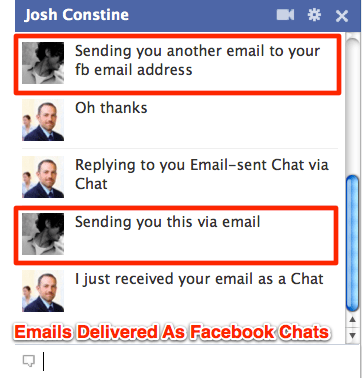Most of the patents that Yahoo is suing Facebook over are for vague concepts that underly a wide variety of web services, but one is for a much more specific protocol that Facebook definitely employs: seamless communication between email and instant messaging users.
If the other patents are ruled invalid for being too broad to enforce, it's maybe this Patent 7406501 that could stick. Facebook could need a separate defense or answer to this complaint, or it could be forced into a settlement to close the case prior its IPO.
Filed way back in 2003 before Facebook existed, and issued in July 2008 by the time the social network had roughly 200 million users, the patent's abstract reads:
"Systems and methods allowing an instant messaging user to exchange messages with an e-mail user. To the instant messaging user, the experience is a seamless exchange of instant messages; to the e-mail user, the experience is a seamless exchange of e-mail messages. Conversion of an instant message to an e-mail message includes insertion of a token into the e-mail message, and conversion of an e-mail message to an instant message includes validating a token extracted from the e-mail message."
My research hasn't surfaced any other prominent companies that provide this service. Many will deliver email notifications about missed instant messages, but not actually allow users to have their full emails delivered as instant messages and vice versa.
 Over two years after the patent was filed, Facebook launched its unified messaging product that offers this service. Email users can send messages to [username]@facebook.com to have them delivered as Chats or Facebook Messages. Messages or Chats sent back are delivered as emails. That means Facebook is directly infringing on Yahoo's patent.
Over two years after the patent was filed, Facebook launched its unified messaging product that offers this service. Email users can send messages to [username]@facebook.com to have them delivered as Chats or Facebook Messages. Messages or Chats sent back are delivered as emails. That means Facebook is directly infringing on Yahoo's patent.
Facebook did make some significant improvements to what Yahoo patented. Rather than blindly delivering communications as Chats or emails, Facebook dynamically assesses what the best delivery medium is. If a recipient is actively logged in and "online" to Chat, they're delivered as Chats. If someone is on the website but logged out of chat, or are completely logged out they're delivered as Messages. If the recipient is on Facebook's mobile interfaces they're delivered through the standalone Messenger product, in-app Messages, or even as SMS.
Yahoo's move to troll Facebook with its patents was dastardly, opportunistic, desperate, and frankly anti-Internet. It's also likely a poor business move because it will make make recruitment very difficult, and could send current employees packing to more scrupulous companies. Still, Yahoo might have a valid patent infringement case against Facebook over instant message-email communication because:
- Yahoo's patent is relatively specific
- The technology is not widely used
- Facebook does appear to infringe upon on the patent
- Instant message-email communication isn't essential to Facebook or social network, Facebook just wanted to make its product better
The case's outcome could include some combination of Facebook buying this patent from Yahoo outright, paying exorbitant licensing fees, offsetting it with patents Yahoo infringes on, and shutting down the feature. Facebook should start thinking which it would prefer.
[Image Credit: Shutterstock - JelanaA]
Yahoo was founded in 1994 by Stanford Ph.D. students David Filo and Jerry Yang. It has since evolved into a major internet brand with search, content verticals, and other web services. Yahoo! Inc. (Yahoo!), incorporated in 1995, is a global Internet brand. To users, the Company provides owned and operated online properties and services (Yahoo! Properties, Offerings, or Owned and Operated sites). Yahoo! also extends its marketing platform and access to Internet users beyond Yahoo! Properties through its distribution network...
Facebook is the world's largest social network, with over 500 million users. Facebook was founded by Mark Zuckerberg in February 2004, initially as an exclusive network for Harvard students. It was a huge hit: in 2 weeks, half of the schools in the Boston area began demanding a Facebook network. Zuckerberg immediately recruited his friends Dustin Moskovitz and Chris Hughes to help build Facebook, and within four months, Facebook added 30 more college networks. The original idea for the term...

No hay comentarios:
Publicar un comentario